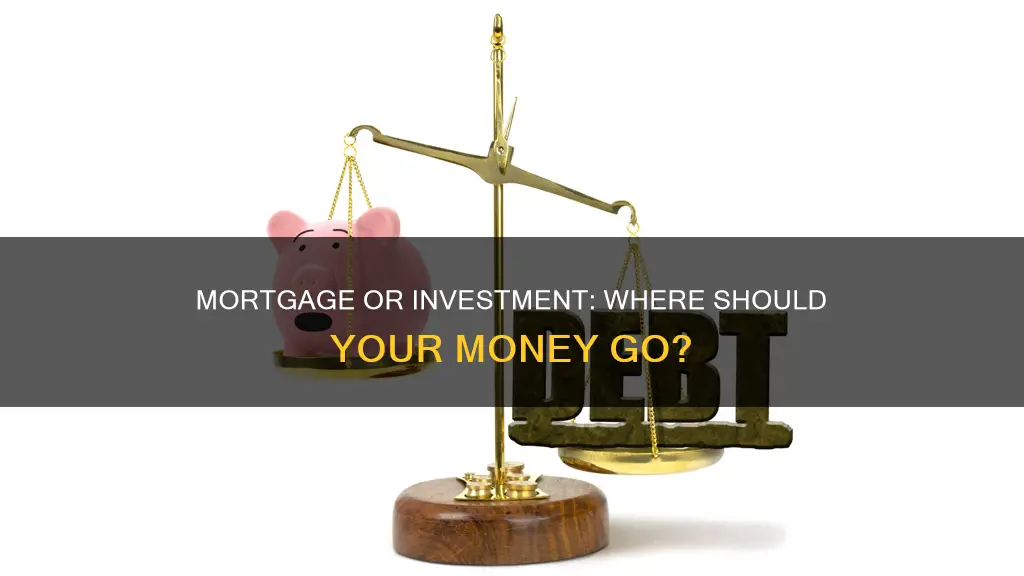
Paying off your mortgage or investing extra cash is a common dilemma for homeowners. The answer depends on your individual circumstances, but there are several factors to consider. These include your risk tolerance, the interest rate on your mortgage, your retirement savings, and your overall financial goals.
Paying off your mortgage early can provide peace of mind and save you money on interest payments. On the other hand, investing your money can potentially provide higher returns, especially if your mortgage rate is low. However, investing carries more risk and may not be the best option if you are averse to debt.
There is no one-size-fits-all answer, and it's essential to carefully evaluate your financial situation before making a decision. Consulting a financial advisor can also help you make the best choice for your specific circumstances.
| Characteristics | Values |
|---|---|
| Risk tolerance | Important to consider when deciding whether to invest or pay off a mortgage |
| Interest rates | Higher interest rates may make paying off a mortgage a more attractive option |
| Investment returns | Returns on investments may be higher than the interest saved by paying off a mortgage |
| Liquidity | Property is an illiquid asset, while investments are more liquid |
| Tax deductions | Mortgage interest is tax-deductible, but this may be lost if the mortgage is paid off early |
| Peace of mind | Paying off a mortgage can provide peace of mind and reduce stress |
| Opportunity cost | Paying off a mortgage early may mean missing out on investment opportunities |
| Retirement savings | It's important to balance paying off a mortgage with saving for retirement |
What You'll Learn

The pros and cons of paying off a mortgage early
Paying off your mortgage early can be a good financial move as it can free up monthly cash flow and save you money in interest. However, it's not always the best option, and there are several factors to consider before making that decision. Here are some pros and cons of paying off your mortgage early:
Pros:
- Interest savings: Paying off your mortgage early can result in significant interest savings. Mortgage interest is charged based on the remaining balance of your loan, so reducing that balance quickly leads to substantial interest savings over the life of the loan.
- Peace of mind: Paying off your mortgage early can provide peace of mind and reduce stress, especially for those who are uncomfortable with the idea of being in constant debt. Owning your home outright means not having to worry about missing mortgage payments and potentially losing your home to foreclosure in the event of a financial emergency.
- Build equity: Paying down your mortgage faster allows you to build equity in your home more quickly, which can help you qualify for refinancing or leverage your equity through a home equity loan or line of credit (HELOC).
Cons:
- Opportunity cost: Paying off your mortgage early means giving up other investment opportunities that could provide higher returns. For example, investing in the stock market or other assets might yield higher returns than the interest saved by paying off your mortgage early.
- Wealth is tied up: Property is an illiquid asset, meaning it can't be quickly or easily converted into cash. If you face a financial emergency or want to seize an investment opportunity, selling your house may not be a viable option due to the time and effort involved in finding a buyer and completing the sale.
- Loss of tax benefits: Paying off your mortgage early may result in losing certain tax benefits, such as the mortgage interest tax deduction and potential tax advantages associated with investing in tax-advantaged retirement accounts.
Ultimately, the decision to pay off your mortgage early depends on various factors, including your financial goals, risk tolerance, interest rate, and alternative investment opportunities. It's essential to carefully consider both the pros and cons before making a decision that aligns with your personal circumstances and priorities.
FTX: Celebrity Investors
You may want to see also

The benefits of paying off a mortgage early
Paying off a mortgage early can have several benefits, including:
Increased financial security
Without the burden of a monthly mortgage payment, individuals may find they have extra breathing room in their budget. This can be particularly beneficial for those who were previously struggling to pay their bills. The extra money can be redistributed to cover high utility bills, credit card balances, college loans, and other kinds of debt.
Reduced interest costs
Mortgages tend to be large loans that last for decades, so paying off the loan early can save individuals tens of thousands of dollars in interest costs. The longer an individual carries a mortgage, the more they pay in interest. By paying off the mortgage early, especially if the loan has a high-interest rate, individuals can make significant savings.
Financial freedom
Paying off a mortgage early can give individuals the financial freedom to pursue other ventures. With extra money in the bank each month, individuals can invest in other economic opportunities, such as starting a business or purchasing an additional property.
Peace of mind
For many, the idea of not having to make a monthly mortgage payment is appealing, reducing stress and providing a sense of financial security. This can be especially beneficial for those approaching retirement, as it allows them to live more comfortably on a fixed income.
Increased home equity
Paying off a mortgage early can increase the amount of equity in an individual's home, which can be tapped into through a home equity loan, line of credit, or cash-out refinance. This can provide a source of emergency funding or allow for home improvements and other financial goals.
Chinese Investors: Where They Put Their Money
You may want to see also

The risks of investing
Investing your money can be a great way to grow your wealth, but it's important to remember that there are risks involved. Here are some key risks to consider when deciding whether to pay more on your home mortgage or invest:
Risk of Loss
One of the biggest risks of investing is the possibility of losing some or all of your original investment. Market fluctuations can cause investments to lose value, and there is always the chance that an investment won't perform as expected. When investing in the stock market, for example, it's common to experience volatility and potential losses. While the average annual rate of return for stocks is 8%, markets can be unpredictable.
Interest Rate Risk
Interest rate risk applies to debt investments such as bonds. It is the risk of losing money due to changes in interest rates. If interest rates rise, the market value of bonds will typically drop. This type of risk is particularly relevant when investing in foreign countries, as currency exchange rates can also impact the value of your investment.
Default or Credit Risk
Default risk is the possibility that a borrower will be unable to pay the interest or principal on their debt obligations. This risk is higher for corporate bonds compared to government bonds. Investing in a single company, through stocks or bonds, also carries this risk. If the company experiences financial difficulties or files for bankruptcy, you may lose some or all of your investment.
Reinvestment Risk
Reinvestment risk is the possibility of losing money when reinvesting principal or income at a lower interest rate. For example, if you buy a bond with a 5% interest rate and interest rates drop to 4%, reinvesting the interest payments at the lower rate would result in a loss compared to your initial investment.
Inflation Risk
Inflation erodes the purchasing power of money over time, and inflation risk is the possibility that your investments won't keep up with the rising cost of goods and services. This is particularly relevant for cash and debt investments like bonds. During periods of high inflation, investments in savings accounts may result in significant losses compared to consumer prices.
Liquidity Risk
Liquidity risk is associated with the ability to convert an investment into cash quickly and easily. Some investments, like property, are illiquid, meaning they cannot be easily converted into cash. If you need to access your money due to a financial emergency or investment opportunity, you may have to sell your illiquid assets at a loss or wait for a buyer, which could take time.
Opportunity Cost
When deciding whether to invest or pay off your mortgage, consider the opportunity cost of each option. Investing your money may provide higher returns, but it also comes with the risk of losing some or all of your investment. Paying off your mortgage early reduces your debt and guarantees a return in the form of interest savings. However, it may mean missing out on potential investment gains.
Remember, it's essential to carefully consider your financial situation, risk tolerance, and investment goals before making any decisions. Consulting a financial advisor can also help you make an informed choice that aligns with your circumstances and comfort level.
GameStop Investors: Who's In?
You may want to see also

The benefits of investing
There are several benefits to investing your money rather than paying off your mortgage early. Here are some key advantages to consider:
- Higher returns: Investing in the stock market or other financial instruments can potentially provide higher returns compared to the interest saved by paying off your mortgage early. Historically, the average stock market returns have been significantly higher than mortgage rates, resulting in greater financial gains.
- Liquidity: Investments such as stocks, bonds, and mutual funds offer higher liquidity compared to investing in your home. These investments can be easily sold and converted into cash if needed, providing quick access to funds in case of financial emergencies or other opportunities.
- Employer match: If you choose to invest in a retirement account, such as a 401(k), and your employer offers a matching contribution, you can take advantage of this benefit. This essentially provides you with free money that can grow over time through compound earnings.
- Wealth accumulation: By investing, you have the potential to accumulate greater wealth over time. This can be especially beneficial if you are in your 20s or 30s, as it allows you to take advantage of compound interest and ride out market fluctuations.
- Tax advantages: Investing in tax-advantaged retirement accounts can provide tax benefits. Contributions to these accounts are often made with pre-tax dollars, reducing your taxable income. Additionally, investing in a retirement account may also allow you to take advantage of tax deductions or credits.
- Financial flexibility: Investing provides financial flexibility by allowing you to pursue other financial goals simultaneously. By investing, you can continue building wealth while also making regular mortgage payments. This ensures that you are not solely focused on eliminating debt but are also actively growing your assets.
- Risk tolerance: Investing allows you to assess and consider your risk tolerance. While investing in the stock market carries higher risk, it also offers the potential for higher rewards. You can choose investments that align with your risk tolerance and financial goals, allowing you to balance risk and return according to your comfort level.
Young Investors: Why the Apathy?
You may want to see also

How to decide which option is best for you
There is no one-size-fits-all answer to the question of whether to pay more on your home mortgage or invest. The best option for you will depend on your individual circumstances, including your financial situation, risk tolerance, and retirement goals. Here are some factors to consider when deciding which option is best for you:
- Financial situation: Assess your current financial situation, including your income, expenses, and savings. Consider whether you have sufficient emergency savings and retirement funds. If you don't have enough savings to cover unexpected expenses, investing more of your money may not be the best option.
- Risk tolerance: Investing in the stock market or other financial instruments typically comes with higher risk than paying off a mortgage. The stock market can provide sizable returns but also carries the risk of losses. On the other hand, paying off your mortgage early can provide a guaranteed return on your investment and reduce your overall debt. Consider your risk tolerance and whether you are comfortable with the potential volatility of investments.
- Interest rates and market conditions: Compare the interest rate on your mortgage with the potential returns on investments. If your mortgage rate is lower than the expected returns on investments, investing may be a better option. Additionally, consider the current economic conditions and market trends when making your decision.
- Retirement planning: If you are nearing retirement, paying off your mortgage early can provide peace of mind and reduce your monthly expenses. However, if you still have many working years ahead of you, investing for retirement may be a better way to grow your wealth over the long term.
- Tax implications: Consult with a financial advisor or tax specialist to understand the tax implications of both options. Paying off your mortgage early may result in losing certain tax benefits, such as the mortgage interest deduction. Additionally, consider the impact of compound interest on your investments or debt payments over time.
- Emotional and psychological factors: For some people, the idea of being debt-free and owning their home outright is appealing. If carrying debt causes you stress or anxiety, paying off your mortgage early may be the best option for your mental well-being.
Remember, there is no definitive right or wrong answer. Carefully consider your financial goals, risk tolerance, and personal circumstances before making a decision. Seeking advice from a financial advisor or planner can also help you make an informed choice that aligns with your priorities.
Medicare and Investment Strategies: Exploring Pre-Payment Options
You may want to see also
Frequently asked questions
Paying off a mortgage early can save you thousands of dollars in interest payments, and the savings are a guaranteed return on your investment. It can also give you peace of mind and help you build equity in your home. However, it can be a risky move as your wealth is tied up in an illiquid asset, and you may lose out on tax breaks.
Investing can give you higher returns than paying off your mortgage early, and your money is in a liquid asset, so it's easily accessible. However, there is more volatility in the stock market than in the housing market, so there is a higher risk of losing your money.
You should consider your emergency savings, retirement savings, other debts, prospects for increasing your income, and your mortgage rate compared to expected portfolio returns.
If you pay off your mortgage early, you are potentially turning down extra money and safety. For example, if your mortgage rate is 3% and you pay it off early, you are saving 3% interest, but you could be earning more than that by investing – especially as savings accounts, CDs, and T-bills are often backed by the US federal government.
Paying off your mortgage can reduce stress and give you a sense of independence and autonomy. However, you should also consider the financial cost: reduced investment earnings, loss of liquidity, and increased risk.







